|
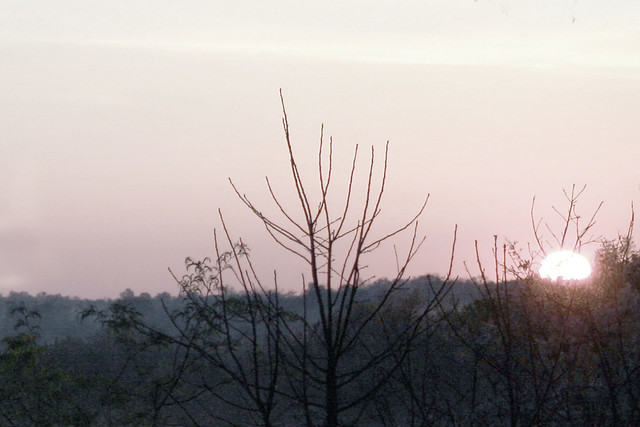
Kentucky morning sunrise.
(*photo credit)
January 1, 2015 Reflecting During Troubled Times
We are trying a unique program in our Daily Reflections for 2015. While each day is made to stand alone, the weekdays of this year are serialized for an emerging seasonally conditioned spirituality. The underlying problem of climate change demands a sustaining spirituality arming us to fight against deniers. For the greater part, our reflections from January through December involve a previous unpublished manuscript judged too long for a single book on Eco-Spirituality through the Seasons. Samples were taken from the draft in creating text for the book published in 2013 with Warren Brunner, Appalachian Sensations: A Journey through the Seasons. A fuller presentation is certainly warranted now.
We start with some basic elements from Down to Earth Spirituality, namely, not focusing on distant places -- there, distant times -- then, or on learned experts -- they. God's creation is beneath your and my feet and worthy of stooping down for a closer look -- here, something deserving of our immediately response -- now, and requiring cooperative sharing by all working people of good will working together -- we.
HERE is our own local environment, which shapes our attitudes today. Yours and mine are different and so my suggestions are meant for you the reader to observe your own world: weather conditions and patterns, topography or "lay of the land," plant and animal species worth further acquaintance, areas needing further exploration, and neighbors willing to share experiences. The HERE of our world must be appropriated and not substituted by some distant expert who knows little about your situation. Your basic stance calls for a unique response and here we place trust in each other. Let 's communicate about our specific ecos experiences.
NOW is the acceptable time to take up our common concerns in a spiritual manner that affords respect for each other, even climate change deniers. We cannot concede the seriousness of the situation nor the fact that we are limited in resources of energy and time when compared to the vast wealth being used to sustain the status quo. We must be realistic, for our time span is closing and still we need fortitude not to panic. This means less scattered subject areas of reflection (though they have value as areas of relief). We must think frugally and sharpen our persuasive skills.
The WE refers to a gathering of like-minded people who must encourage each other against burnout and distractions. Acting in an individual manner forces us to confront our limitations and the need for others' talents. The road ahead is quite rough and nothing is certain except death and taxes; we don't know the exact time of the first nor exact amount of the second. WE must trust together in the Lord and keep our vision and listening capacities open to emerging yet now hidden collective goals. What the coming system is like is not yet evident -- but it must come to be.
Prayer: Lord, make us trustful in fulfilling our calling.

Ground cherry, Physalis virginiana, seed pods in winter.
(*photo credit)
January 2, 2015 Reasons Climate Change Is Not Given Top Priority
Why begin the year with troubles? Why not, for we are in the middle of them and that is the only way to determine a positive course of action? Some 400,000 of us marched last September in New York City in the People's Climate March. The issue is utmost on many of our minds, both in America and elsewhere. However, two other prominent trouble areas stand out in the last few months, namely, the Ebola epidemic in West Africa and the terrorist activities of ISIS in Iraq and Syria. These are serious and still a distraction from the threatening climate change issue, with its rapidly closing window of opportunity. While not as emotional as other issues, we list twelve reasons why climate change should have top priority:
1. Demands for a conservation ethic -- Heavy demands are being made by the general public to address this issue through a participative process that many naive consumers oppose.
2. Inherent negativity -- All negative issues (including the Ebola Epidemic and the ISIS insurrection) are more handicapped for popular support than positive ones with immediate benefits.
3. Aggressive denial by commercial interests -- Hundreds of millions of dollars are involved in the denial campaign now being undertaken by industrial capitalists with their profits threatened.
4. Difficulty in proof of condition -- Much of what is coming is based on scientific projections along with data of the past two decades. Climate issues are difficult subjects to determine.
5. Delay in real effects -- The natural inclination is to put off future generation problems because selfish people think only of themselves in the current situation, not issues for grandchildren. 6. Arrival of cheap and plentiful fracted fossil fuels -- For some a godsend, but for the champions of renewable energy a delay and distraction because of immediate lower-priced fossil fuels.
7. Promotion of renewables -- These sources have never had the government's subsidies and tax benefits of fossil and nuclear fuels, and thus have had to compete with far greater handicaps.
8. Transition period required -- In the movement to a renewable economy, fossil fuels will play a transitory role and compromising on amounts and time lengths is extremely delicate.
9. Politicization of issue -- Republicans were environmental supporters for several decades but recently have become ace deniers of climate change and form a road block to addressing this issue.
10. Contrary to a consumer culture -- The current economic system of privileged consumption by affluence is augmented by the continuation of the status quo with heavy commercial support.
11. Call for a new Economic Order -- Progressives realize that perpetuating the status quo is shutting off debate exposing the current economic system as having caused the environmental crisis.
12. Less emotional Issue -- Granted, in the competition for press attention the longer-term call for addressing climate change does not have media captivating attention like emotional issues.
Prayer: Lord, give us the courage to show the difficulties associated with the climate change issue and address them now.
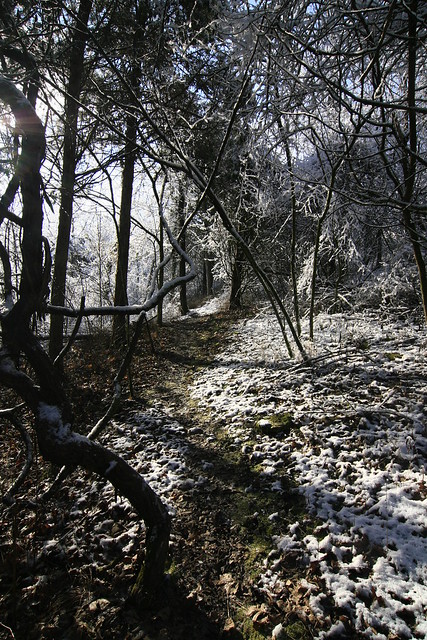
A winding path through Kentucky woods.
(*photo credit)
January 3, 2015 Discovering Sacred Sights
Look around you, look at the fields,
already they are white, ready for the harvest.
(John 4:35)
January is the season of mystery. On a crystal-cold winter night we look out and see beyond the horizon of our limited world. The blinding light that flashes across the heavens announces the beginning of the creative act. The holy night, when all is still, the Savior comes on his own, and that is a sacred sight seen only by a privileged few. We think back about our own birth, though unremembered. Our eyes open after the darkness of our maternal womb and we behold an incandescent light that announces our coming onto our own. It is a sacred sight.
God gives an order, divine word flashes to earth:
to spread snow like a blanket, to strew hoarfrost like ashes,
to drop ice like breadcrumbs, and when the cold is
unbearable,
God sends word to bring the thaw
and warm wind to melt the snow. (Psalm 147:15-18)
A snow-covered landscape is the Creator's masterpiece, each
snowflake a different design (at least that's the theory impossible to verify), each curved snow drift nature's work of art. The sight is a jewel to be gazed at from a distance, without daring to step out and disturb the almost perfect landscape. Well, not quite undisturbed, for cottontail's tracks are there and other wildlife will surely follow soon. This fresh blanket of snow is like the cloth placed over a coffin at Church, signifying the baptized person's journey to eternal life.
--------------------
Mark Spencer and I were able to climb to a prominent peak in the Sangre de Cristo Mountains near Crestone, Colorado. We started the evening before, camped overnight at treeline for an early final ascent and then reached the top in late morning on a sunny June day. We peered over the peaked ridge and saw the northern side, which was as though in the middle of winter, covered with snow and mist. Suddenly I realized why several previous June attempts resulted in being bogged down in snow -- we attempted a north slope approach. Much depends on where the sunlight hits the range and peaks; obvious to Rocky Mountain folks! Just being there above 14,000 feet was a unique experience, a sight to behold.
------------------
Road cuts, stripped hillsides, and clearcut forestlands are for a brief moment covered over by new snow. Abused land is hidden from sight. This pall-covered suffering land recalls for us the divine promise to cleanse us of our faults, to make us pure as new-fallen snow, and to give us new life. Snowfall in January signifies forgiveness and renewal. We glory in this short-lived scene, this epiphany of God among us.
Prayer: Lord, help us celebrate what we see and that we see, and give us the courage to probe the hidden and unseen.
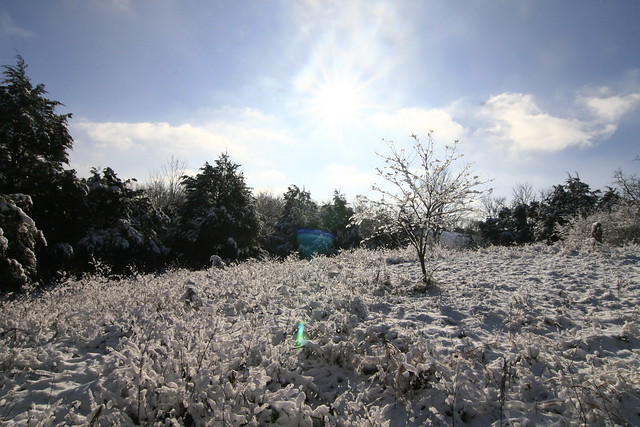
A young redbud basks in winter sun.
(*photo credit)
January 4, 2015 Epiphany: Manifesting Mystery
Epiphany is a divine manifestation, a public viewing just as is the Baptism of Jesus and the Cana Wedding. For many cultures, this feast is "Little Christmas," a child's event. Parents take their offspring to the manger display and show them the rearranged figures of camels and Magi in place of shepherds and sheep. But is this not also an adult's feast as well? Perhaps youth have something to teach us in the manner in which we approach mystery. Those who are not distracted by over-affluence come before the Epiphany display with a sense of wonder and adoration. We also need to see the Messiah's manifestation as a time in which we wonder about our very sense of wonder and mystery -- and hopefully we are not sated by affluence.
A manifestation of God's glory gives us the consolation we need to balance our actions and judgments and cultivate an interior ecology needed so we are not paralyzed by anger or panicked by the shrinking span of time for environmental action. Ordinary life is demanding; we could fool ourselves and think that the immediate anxieties of life are the truly real -- when this can be distracting. We must take reflection time or we cannot see what God has in store for us. The temptation is great to shorten prayer and reflection because "important" daily matters press upon us.
Let's start each day as a time of thanksgiving for precious life itself; let's end each day with additional gratitude for being still alive and hopeful. Certainly our praying includes petitions for self and others and a request for forgiveness due to mistakes made. But the heart of reflection are the gifts received over the years and especially in these troubled times. To see God-given gifts in our midst is an adult participation in Epiphany. To see the universality of these throughout the world elicits a deepening sense of that gratitude by a growing body of believers.
The Christmas season is exhausting, with material cares and accumulated stuff. Let's not get caught up in the symbolism of Matthew's Gospel gifts of gold, frankincense and myrrh. They are precious, not necessarily bulky (depending on the amount of gold) being brought from a long distance by camel power. What we bring of ourselves to the newborn infant is who we are and where we are on our journey of faith. In many ways we must be as humble as a young child approaching the manger, for what we give is imperfect; it bespeaks of a fleeting time with a window closing. We bring ourselves with all the scars of Earth -- but with future hopes.
Note: On the twelfth day of Christmas we could follow an Anglo-Saxon tradition and "wassail" the apple trees by drinking to the health of the oldest ones. We celebrate nature's first awakening in dead of winter, a hidden change we sense is happening. Let's not forget amid concerns that we have much to celebrate.
Prayer: Lord, help us to see the troubles we face but to do so in a light-hearted manner.
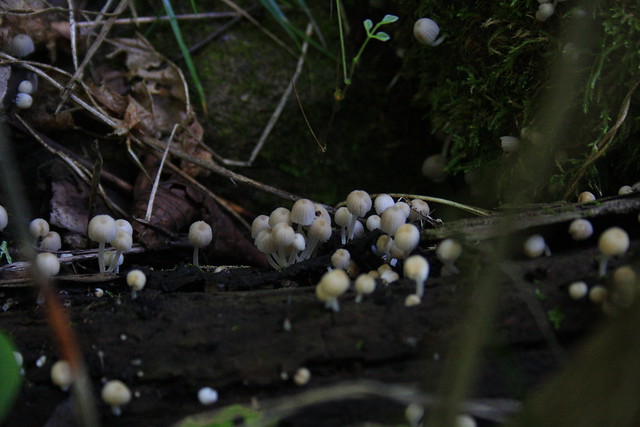
After mild winter rain, a ring fungi appears on the forest floor.
(*photo credit)
January 5, 2015 Moving Us to Divine Mystery
Ever since God created the world the divine everlasting power and deity -- however invisible -- have been there for the mind to see in the things God has made. (Romans 1:20)
I'll never forget the western part of South Dakota in 1955 when I saw the beginnings of the Far West for the first time. We had crossed the Missouri River at Chamberlain, and moved towards the color-subdued Badlands just ahead in the sunset. It was a new world, an unseen now seen, a sampling of God's glory.
The mystery of our Earth and beyond confronts us, especially when minds are free to reflect. Yes, we must dare to give time to look out and observe. We come to God in different ways and are colored by our cultural outlooks. Some of us cling to a natural theology that holds that the only true God, our Creator and Lord, can be known with certainty through his works by the natural light of the human reason.
The Protestant theologian Pore Pere finds fault with this natural theology and with what he considers to be the Catholic exegesis of the above passage from Romans. Henri Bouillard, in The Knowledge of God (New York: Herder and Herder, 1967), defends a natural knowledge of God, something that I have always found most comforting since taking a course in Natural Theology in 1959. However, Pere's fear of constructed idols is worthy of note since human beings unguided by Revelation will tend to create their own gods. Bouillard says St. Paul discovers a knowledge of God in the idolatry of pagans. Noting that pagans demonize creatures, Paul reflects on this conduct in order to understand both its possibility and its culpability (Bouillard, p. 51).
Natural grandeur is enhanced by all around us, and even by the modern theory of evolution. Here the intelligent divine design of the Creator is expressed through natural phenomenon. For centuries the intellectual and rational process has been considered a manifestation of the Creator -- a fertile field for thinkers from St. Augustine to Thomas Aquinas and beyond. Mental "artifacts" have been the domain of the scholastics and then the academics.
Today our faith journey when graced by divine favor allows us to enter the deeper realms of Mystery, with help both from science and Divine Revelation. We accept that the creative act is at work. We concede that difficulties arise as human beings take evolution within our own power, a power resulting from our invitation into the divine family and the work of healing a wounded Earth. Mistakes can be and are made. We are called to be participants, neither to draw back in fright nor to plunge ahead as foolhardy adolescents. In recognizing our calling we glory in the privilege and are humbled by the magnitude of work ahead.
Prayer: Lord, give us the power to see more clearly how we enter into the life of Divine Mystery.
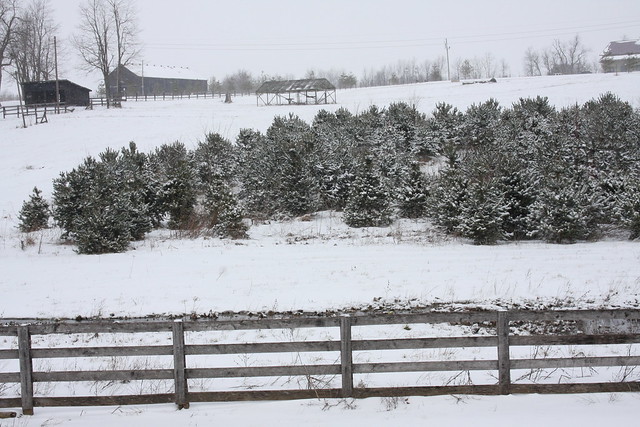
Tree farm in snow. Woodford Co., KY.
(*photo credit)
January 6, 2015 Observing the World Around Us
Eco-spirituality encounters faith -- seeing the brilliant countenance of Christ looking up at us from every creature.
(My ordination card)
Gerald Manley Hopkins would keenly observe the microcosm at his feet to such an extent that he would lie prone on the ground motionless for long periods of time. On one occasion, a community brother thought Hopkins was stricken because of his strange motionless posture in the garden, lying perfectly still for a long time. The brother became alarmed and went to his aid but that only caused Gerald to apologize and continue his observations.
Observers may look out at the heavens, the traditional seat of divine majesty, to proclaim God's glory -- and this can certainly be a humbling experience. How can I imagine a million light years in span and miles? This seems to overwhelm us. As a down-to-Earth person, I look down and discover a world beneath my feet, a world of earthworms and insects, composting soil and decaying leaves, a world that permits an avenue of interest as well as glory and splendor. Microcosmic attention is more to my personal taste and seems more within my reach than a distant star. Let's tolerate the preferences of others who look at the heavens. Some may be mesmerized by awesome artifacts: roads, bridges, towering buildings, humble shrines, statues, rows of corn on the Great Plains, boats, trains, airplanes, factories, well-preserved forests and clean beaches. They may even find it hard to avoid an accident when driving down an Interstate when a blooming wildscape distracts them, or at this time of year by icicles on a road cut.
January is a month when the naked trees show their true form, a laying bare of what in summer is nature's green covering. We hike unhindered across the countryside and scan the wider vistas; we concentrate on the summer-hidden wounds of bare hills; we strive to get to the roots of things, for winter really begins the growing season. January is a practical, down-to-earth time and yet quiet enough to look out at the stars, a searching mode, a standing at the doorway of the grandeur of God's creation, and spending time in praise of the Holy One. Time never stands still, and winter, while certainly slow moving, never allows us to forget the moving clock.
We point to the crisis-ridden Earth around us with its flooding one month, hurricane another, massive earthquake on the third, and whacked with seemingly endless warring factionalism. If willing to be attentive we cannot ignore these signposts; nor should we let these happenings overcome us in a modern angst that saps energy and drains creative juices. Simply put, January is the acceptable time to sense mystery, survey the cosmic phenomena, redouble our openness to every new calling, and proclaim the harmony all about us; it is beginning a new year of life.
Prayer: Lord, help us control the unsettling flood of images that we see; give us modesty of the eyes and brain so that we can attend to a world with a threatened unbalanced climate.
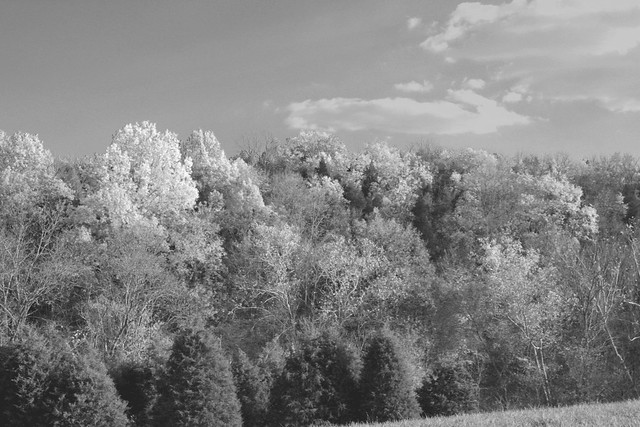
An inverse of black and white of summer image creates illusion of winter.
(*photo credit)
January 7, 2015 Seeing the Mystery in All Creation
Ah what is man that you should spare a thought of him ...
Yet you have made him little less than a god, you have crowned him with glory and splendor. (Psalm 8:4a, 5)
I have always admired the colorful butterfly and the manner in which it can enliven my day. The butterfly museum at Hunawihr near my ancestral home in Alsace, with its colorful and graceful flying creatures, is an absolute delight to visit. That admiration of sight extends to observing butterfly feats from here. A monarch butterfly travels from Kentucky all the way to Mexico for its winter sojourn, an incredible undertaking of over a thousand miles by such a small and delicate creature. Let's marvel!
Creation is wrapped in mystery, the creation around and the creation within us. Young children experience that first dawning of mystery and reach out with awe and wonder. As adults we may not attempt to test a new thing by putting it into our mouths, but we are fascinated by new places, enticing scenes of sunrises and sunsets, and beautiful artifacts. We venture into scientific descriptions of geological phenomena, the architecture of termite hills, and the bonding of atoms. We believe in a Creator of all that is seen and unseen; that includes what we see through naked eye and telescope, and the part never yet seen, or mysteries that the eye can never see. The awesome power of God struck me deeply when I saw a television show on the first moments after the Big Bang. We appreciate creativity expressed through craftspersons, artists, researchers, and ordinary people. Amid all experiences we discover our inability to plumb the depths of Mystery.
Awesome respect covers us like a blanket, a pervading atmosphere which nurtures our faith. This awe overshadows our first actions and is present in a bewildering array of undifferentiated mysteries which begin to unfold before us, causing us to blink and rub our eyes. In youth, we sense the threefold nature of mysteries: the created world around us impregnated with mystery; our own mysterious interiority, which is the world within us that beckons us to a lifetime of searching; and finally the deepest Mystery, the Holy One, our ultimate Source and our final End, our Alpha and Omega. These sources are not seen separate at first, but an unfolding of our own history.
We go to a park, wildlife reserve, mountain, seashore; we gaze into the heavens. We breathe fresh air and absorb full spectrum sunlight. We notice particular trees, birds, mountain forests, rolling meadows, gurgling streams, the roaring seas and waterfalls, and on and on. Some take photos of these sights seeking to concretize them. A billion poems and a trillion memories punctuate these mysteries of creation. We collect all as though we can hold on to them, and yet they seem to slip away. And when memories fade, we see visions.
Prayer: Lord, need we repeat, help us to see more clearly.
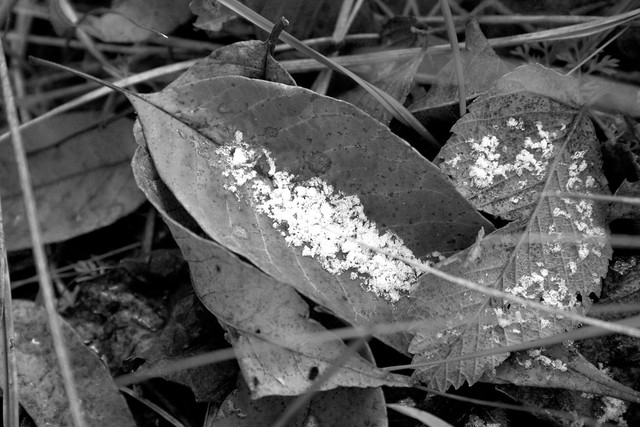
January snow on fallen leaves.
(*photo credit)
January 8, 2015 Perceiving Mystery Within
Childlike wonder fills the natural adventurer. We see and don't see; we strive to know more and yet find limits in our attention and time. God's grandeur is present but, as purists, we dare not stare for that is embarrassing. Is it more natural to reach out and grab hold of creation as a small child attempts, or to accept the impossibility? Some of us would argue that it is more natural to take hold of and improve natural things, for we are part of the total natural picture. Others say that nature should be left alone and should remain removed, for they know we are limited; they insist that wilderness be set apart from human reach.
In the early 1970s the late Rene Dubos spoke to a meeting of the American Association for the Advancement of Science on this subject of restraint and involvement; essentially he proposed that human action and improvement are part of the natural process. He argued that we, as part of nature, can transform it for the better. I liked that man; he was one of our earliest and most respected advisors at the Center for Science in the Public Interest and wrote a number of books including The God Within. He gave me strong support in my early writings and was one of the organizers of the Stockholm United Nations Conference on the Environment in 1972, where I conversed with him for the last time.
The creation that surrounds us reflects divine glory and encourages us to delve deeper into discovering the wonders of creation within ourselves -- another untapped world. We reflect upon ourselves, our relations to others, our neighbors who include human beings scattered around the planet, along with diverse plant and animal species. In knowing others we sense the complexity of creation for every person is unique and yet this is part of our maturation process. Other creatures are our companions on our spiritual journey of faith; they encourage us to gaze within and discover the infinite world of self, a source of mystery that also can lead to godliness. But we hesitate because of the temptation to self idolatry, a possible narcissistic creation.
In more proper individual growth we can probe the mystery of self and say with the truly humble Mary, Yes from this day forward all generations will call me blessed, for the Almighty has done great things for me (Luke 2:48-9). This blessedness has a divine source and we are humbled by being privileged. Yes, we have power to express our inner creativity, as we will see; we can cooperate and share with others; we can heal and teach and do deeds of great benefit; but it is only because we participate in deeper Mystery -- and that is a divine gift. As we probe the depths within, we find ourselves asking over and over, Why? Why? Why? Each partly answered question affords still another question, never ending or satisfying, but we continue along the mysterious pathways and stirring of the soul to a God who invites us beyond ourselves to absolute Mystery.
Prayer: Lord, help us grow interiorly and humbly.
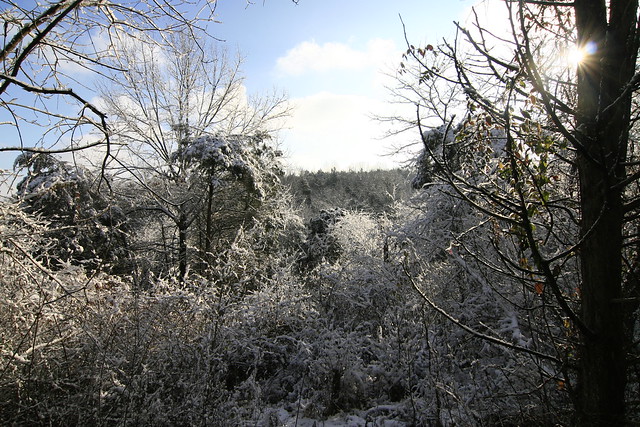
An eastward view on a snowy winter morning.
(*photo credit)
January 9, 2015 Looking Up to the Heavens
I look up at your heavens, made by your fingers, at the moon and stars you set in place. (Psalm 8:3)
I was part of an environmental team exploring solar cooker possibilities in Peru. We made a side trip to Lake Titicaca in the remote Bolivian border region where there was no electricity. The night was black except for the heavens and there was the Southern Cross, stars I would never see again and with such brilliance. It left a permanent memory of glory.
Some prefer to start their observing quest with the vast universe, with its incomprehensible distances of light measured in the years it takes for a beam to travel at the speed of light. In a rare personal occasion I spent last night outside during Full Hunter's Moon observing an eclipse. Along with other observers, I encounter astronomical distances that are almost incomprehensible. I observe a tiny fraction of stars twinkling above with pinpoints of warmth and color in a vast outer cold and dark space.
Part of January's outdoor experience is to observe the heavens that stand out in the clear nocturnal heavens. I prefer to start at ground level with down-to-earth scenes, but others start with looking up to the heavens and for good reasons. Admittedly, that is more tempting in winter when the microcosm is frozen and the macrocosm is so inviting on clear nights. For decades, I thought rural folks look down at the fresh soil below them and urban folks looked up to the heavens and its vastness. What a gross oversimplification! Besides, today many people in urban areas are plagued by "light pollution," the effects of artificial lighting that obscures the immense panorama of the heavens.
The night sky remains a last great natural frontier of God's creation. A century ago, scientists focused on one galaxy with its estimated one hundred million stars. With modern instrumentation observers extended the heavenly viewing domain; now we know our Milky Way contains a multitude of stars and that there are countless galaxies in the universe, each with additional multitudes of stars. Who are so insensitive as to never look upward or to be awestruck at the sight of the heavens on that clear cold January night? Would they not wonder about the properties of these heavenly bodies: their color, shape, light texture, movement?
How can one even imagine a light year and yet we speak of thousands or millions of them in universe distances? And amid vastness we speak of the almighty Creator. Experts with high-powered telescopes plumb the heavens. Does the grandeur of God's cosmos trigger a prayer of praise? Maybe for someone it could be a resolution to take deprived urban youth beyond the light-polluted metropolitan area for their first chance to see a star-lit night. What a privilege!
Prayer: Lord, heighten our sense of wonder as we look up.
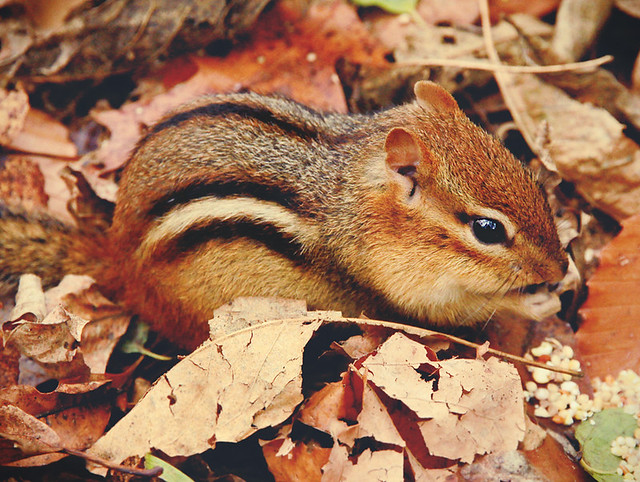
A "snacking" chipmunk.
(*Photo by S.L. Cox, Creative Commons)
January 10, 2015 Gazing Always Ahead
Pride of the heights, shining vault,
so, in a glorious spectacle, the sky appears.
The sun, as he emerges, proclaims (radiates heat)
at his rising,
'A thing of wonder is the work of the Most High!'
(Ecclesiasticus 43:1-2)
We do not journey through life with heads turned backwards, lest we stumble. We do not look constantly out to the distant horizons lest we again lose our footing. Joggers are aware of the road immediately ahead, the here where we are at a given moment. Finding God in all things is what we seek to do, and yet we watch our steps. We look into places others often ignore, but the great surprise is that God is with us here and now -- and thus we refrain from over concern about future or past gazes. If God is everywhere, surely the Holy One is in the hidden crannies of this Earth and our personal inner worlds as well, the HERE. God is with us in the menial tasks of cleaning house, preparing meals, gardening, repairing, sleeping, eating, and jogging.
God is deepest Mystery and the source of all mysteries around us and within us. We assert this on faith. At first, we are captivated by the mysterious in the divine handiwork, Yahweh imprinted on the world around us. We look within ourselves and find another world of mystery and seek to fathom this in our soul and within the inquiring powers for deeper and deeper questions and answers. God does not leave us orphans. Believers see Jesus as seat of ultimate Divine Mystery, who keeps us close through sacramental life. We trust his words -- To have seen me is to have seen the Father. (John 14:9b). Jesus is faithful; he guides us through our wilderness, our bewilderment. He turns wilderness into a friendly place, a neighborhood worth protecting. Jesus is the gentle companion amid the glorious array of creation that reflects divine glory. He beckons us to come to the incomprehensible Mystery that will be before us on an eternal journey of love. God is Mystery. God, the Creator be praised! Let nature's beauty unfold! Let me be drawn to Mystery as a moth to light! And help us someday to see that light!
Nature speaks in more than sight. In winter we attend to sounds and tastes and smells as well: creeks gurgle under snow banks; thunder announces a dramatic change of weather; the chipmunks chirp bounding about in search of food. When we listen more intensely in this season we may even hear disharmonious sounds: flooded streams rushing down a denuded mountainside; the crash of a broken tree in a cut over forest patch; the crow squawking when disturbed. Sights and sounds work in harmony in an elementary way first perceived by the child in a world of activity.
Prayer: Lord, teach us to see ahead and to learn to be attentive to all that other senses have to provide. Help us to look out for greater things.
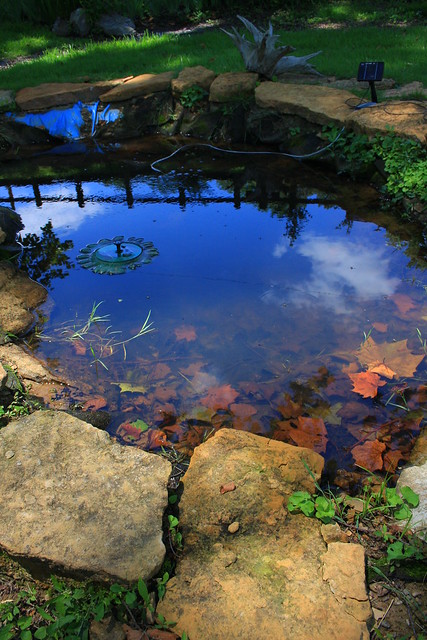
Reflections in pool. St. Elizabeth of Hungary Church. Ravenna, KY.
(*photo credit)
January 11, 2015 Considering the Meaning of Our Baptism
No sooner had he [Jesus] come up out of the water than he saw the heavens torn apart and the Spirit, like a dove, descending on him. (Mark 1:10)
The Spirit comes to Jesus and to each of us when we are reborn in the completion of Baptism at our Confirmation. We too are filled with the Spirit and thus given spiritual insight to see and do what God wants us to be and do. Jesus' ministry is launched on the banks of the Jordan River. John the Baptist objects to performing such an awesome task and yet he is reassured by Jesus; John professes his unfitness for the mighty task ahead. In some way, this dramatic second manifestation of Jesus that follows that of the Epiphany is an invitation to participate in the mystery of the salvation process. We as participants feel our unworthiness.
The divine favor rests on the Chosen One, but that resting is a focusing, a special gift that is not meant to be clutched as a sole possession. Water is poured on Jesus just at the place where the Jordan is a fast flowing stream in springtime. The rushing water manifests a coming of the Spirit, an enlivening for the mission ahead. The rushing water foreshadows the movement of Jesus out from his native Galilee to Jerusalem; it foreshadows the pouring forth of Pentecost, and the passing of the mission on to his disciples. Through the course of Salvation History we observe God's favor resting on One, but the descent of the Holy Spirit would also occur on each of the disciples and ultimately on each of Christ's followers, resting on us.
Peter speaks to Cornelius, "I begin to see how true it is that God shows no partiality. Rather the one of any nation who fears God and acts uprightly is acceptable to the Almighty" (Acts 10:34-35). Peter as leader of the Apostles begins to sense the utter majesty of the grand work of salvation and he finds himself at a loss, being a mere human instrument in the work ahead. All God-fearing persons are within the arena of God's favor -- but each of us must see the need to do what is right in order to be fit instruments in the divine plan. God's favor rests as a gift that we certainly do not merit or have owed to us in any way; but it is freely extended if we follow Jesus. The role of Peter is to accept the universal mission and to bring Good News to others who will follow the pattern that Jesus has undertaken.
Our Baptism washes away the stain of sin and bestows new life on us. This is our regeneration, preparing us to be the bearers of Good News. Our baptism is a launching pad, the most important moment between our birth and our passing from this life. We cannot rest by saying that we have been saved and such is sufficient. We now must respond in an individual manner through the righteous living of our lives and performing good deeds that are needed to save our troubled planet.
Prayer: Lord, make us aware of the awesomeness of our baptism.
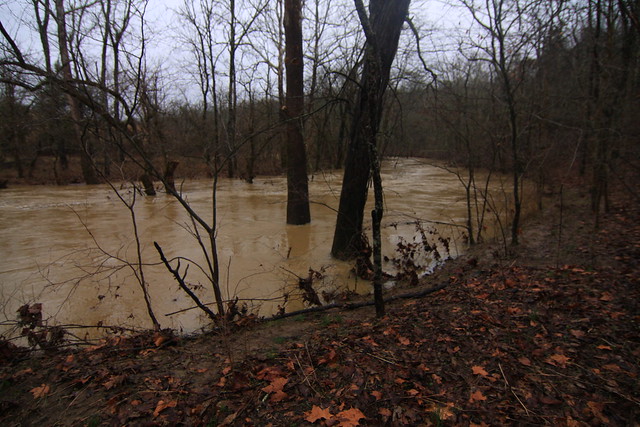
High water along Thompson Creek, KY.
(*photo credit)
January 12, 2015 Hearing the Call: To Each His/Her Own
The heavens declare the glory of God, the vault of heaven proclaims God's handiwork; day discourses of it to day, night to night hands on the knowledge. No utterance at all, no speech, no sound that anyone can hear; yet their voice goes out through all the earth, and their message to the ends of the world.
(Psalm 19: 1-4)
We were gathered on the porch of Great Aunt Mary and Great Uncle Joe's home, the 1812 Bruce House, in Fleming County. Father Danz had come out to visit them on that Sunday afternoon. For some unexplained reason I went up and told him I wanted to be a priest. He was the only person to whom I confided this for two decades.
We listen and hear God's call, a constant call in the springs, summers, and autumns of life. Yes, I was called in that eternal winter before my birth, in the ages before I was even a glint in my parent's eye. I enter God's ever present tense and have a place even before I come to be. It is mystery extending from preconception throughout our journey of faith.
God calls us from that distant eternity and, once existing, we are called as our mind becomes active and as reasoning appears. We hear God's call in the seasons of our life both at specific times (as St. Paul's dramatic call in being knocked from a horse) and throughout our journey of faith. God calls us to take on good causes, to move to marriage, religious profession, graduation from professional school, and other important stages of life. God calls us back when we err and then to adjust to new assignments and directions in life. God's calls become part of our continuous adventures, an unfolding story which becomes part of our quest.
We can enter this quest wholeheartedly or we can allow ourselves to be distracted by other allurements. We become aware that our impulsive question-asking power never ceases. The young child's questioning gives way to an equally inquisitive maturing traveler seeking answers to the rough road or journey ahead. We are free to pursue our questions and say "yes" or "no" before our God, for at times we hesitate and turn away; mercifully we are called over and over even to the hour of death.
The phenomenology of life's journey, the "travelogue of faith," makes up the totality of our personal experiences. We never see it from a distance for we are immersed in the rushing moment. We get a glimpse of the trips of others as they pass by, but only a glimpse. Each person's venture is unique with its challenges, burdens and high points, but patterns develop which challenge the scientists of mind and personality. Friends, companions, spiritual directors, and counselors guide us; they help us through our seasons of life. Precise spans of life's seasons are comprehended nearer the end of the journey, when we prepare to go to deeper Mystery -- and we have a chance to look back.
Prayer: Lord, keep us faithful to our calling.
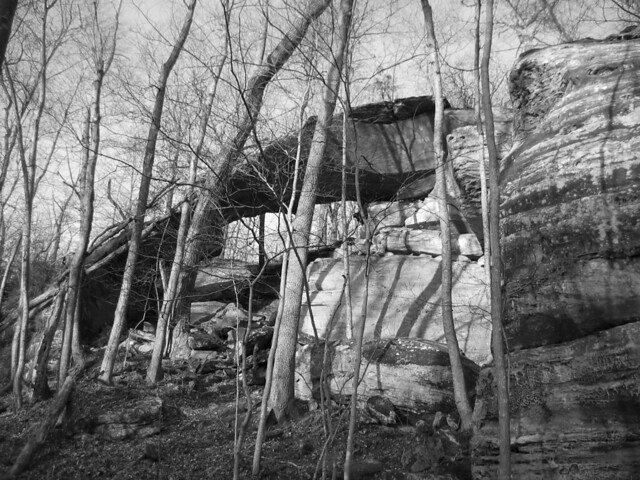
Raven Arch, Carter Caves State Park.
(*photo credit)
January 13, 2015 Earthhealing: A Call within a Call
Teach us to count how few days we have
and so gain wisdom of heart. (Psalm 90:12)
Never was the call so pronounced as when I traveled up I-35 from post-doctorate work at Austin's University of Texas. It was a call within a call within a call -- that of a scientist, a Jesuit, and now of public interest work in Washington, DC. I hummed "Spirit of God in the clear running waters" all the way.
God calls us to deeper levels of service. In freedom, we are all invited to respond. At our infant baptism our godparents answered for us the invitation to enter a faith community and to serve others. It takes time and maybe a lifetime to respond fully to that call. Through sacramental life we mature as followers of Christ. Go out to the whole world; proclaim the Good News to all creation (Mark 16:15). This is a Christian's call to respond to Earth herself in time of need. Earthhealing is an authentic call within a call, a true vocation for all of us.
Through dialog with my religious superiors I entered into environmental and public interest activities at the start of my priestly ministry in 1970 -- and on until now. This ministry was reaffirmed in my only trip to the Holy Land in 1992, sponsored by the Society for the Protection of Nature in Israel, a tour of environmental education centers. I asked my companion (a Cypriot who knew Arabic as well as Greek) to help me hike over across the Kedron to the Church of the Holy Sepulchre, for it was my only chance to touch the ground on which the Savior's blood soaked. Time passed and the bus would leave promptly by 9:00. We found the place and even went to Mass with other Americans at the tomb a short distance from Calvary's mount. With great trepidation and a feeling of grimy unpreparedness I rushed up the steps, reached into the dark hole to touch Calvary's rock and distinctly heard the words spoken with deep compassion, "Look what they have done to my Earth." It is a source of continued consolation.
God is generous and gives special gifts to everyone. These differ because of the vast uniqueness of all on individual spiritual journeys; they depend on our personalities, talents, family roots and environment, culture, sex, educational history, and aspirations. We all are on our quest for Mystery, which early on is youthful venture with its detours and blind turns, but become ever deeper as we advance in life. Our journey of faith ultimately is a single whole, though containing detours and short cuts during our seasons of life. Some are profoundly remembered and others, like mini-strokes, are ignored or forgotten. Part of our journey is taken seriously and unfortunately part is misdirected and costly for all concerned.
Prayer: Lord, give us strength to hear the call of a wounded Earth for compassionate restoration and the courage to respond. Let us not be discouraged by our failures of the past.

Falls of water along Watts Ferry. Woodford Co., KY.
(*photo credit)
January 14, 2015 Listening to Sacred Sounds
The footsteps of those who bring good news is a welcome sound. (Rom. 10:15)
In the beginning was the Word -- heard only by God. Yes, God speaks and God hears what is spoken, and that is an eternal communicated Word. God speaks further with the sound of the "Big Bang," which still resonates throughout the universe and can still be detected now by certain sophisticated instrumentation. Is it not the ringing in our ears when we are in tune? Winter's stillness invites us to enter a listening mood and attune our auditory senses. We break our sacred silence through testimony in a world overwhelmed by discordant noises.
In my novitiate days we experienced a set time from evening to early the following morning prayer called "Sacred Silence." Even outside that rather artificial atmosphere we could still set times of sacred silence in our noisy lives. These are periods when we recall, plan, reflect, and talk with God. Ours is not a total silence of course, since we must go out and perform our business, but January has its moments for listening for unrecognized sounds.
Then I heard all the living things in creation --
everything that lives in the air, and on the ground,
and under the ground, and in the sea, crying,
"To the One who is sitting on the throne
and to the lamb, be all praise, honor, glory and power,
forever and ever." (Revelations 5:13)
Squeals of delight are part of the chorus of living beings. So are the coyote's howl, the ruffed grouse's thumping, the owl's hoot; all blend with the excitement of youth at winter play. Creatures praise the Creator through winter sounds unmuffled by summer foliage. The joy expressed in riding a sled is part of the chorus of creation: birds and animals awaken plants and trees and call the sap to rise; even in winter our celebrations are part of nature's performance. These new-found winter sounds manifest immense contrast. In winter they are unhindered and carry for miles. Then it starts to snow again; winter suddenly returns to a pause of sacred silence, for falling fluffy stuff creates a very quiet period. Thus, when snow falls and before outdoor winter sports begin, we pause and listen, and listen, and listen. God speaks in gentle breezes and even in falling snow. Spiritually-tuned ears can distinguish pauses in nature's winter symphony.
Establishing harmony is a delicate matter, one easily overlooked by the insensitive or distracted. Nature has its own harmonies: biodiversity of flora and fauna, carbon and nitrogen cycles, wildlife migratory routes, ingenious construction of a den or nest, repertoire of mockingbirds, budding trees, adaptive ways of flourishing forest understory, and on and on. Nature speaks.
Prayer: Lord, help us pause to listen to you speaking to us in these critical times. Inspire us to take these sounds to heart.
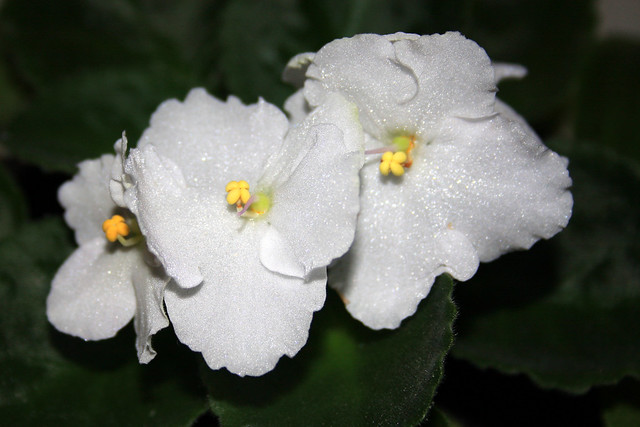
Enjoying blooms of African Violets grown indoors.
(*photo credit)
January 15, 2015 Reaching Deeper Harmony
Let the heavens be glad, let earth rejoice, let the sea thunder and all that it holds, let the fields exult and all that is in them, let all the woodland trees cry out for joy.
(Psalm 96:11-12)
Those of us committed to a spirituality based on The Spiritual Exercises of St. Ignatius (of Loyola) often visualize particular scenes in the life of Jesus as part of our meditation. Ignatius encourages us to allow our imagination to relive the reality of the sacred Mystery, which is the subject of the meditation. God's unfolding creation challenges us as a subject of our prayerful attention. Jesus' life is a part of the believer's unfolding journey of faith and this invites us to deeper companionship. We make use of the windows to our soul -- sight, sound, taste, aroma, and feeling. We discover the harmony of our head, heart, and hands: interior harmony in tune with nature's deep Mystery.
Earth's creatures join in the harmonic rhythms of nature and show their awareness and respect in the way they live. Only those creatures of free will are capable of disharmonies within that fine-tuned world of sound. Primitive peoples are often keen observers of seasonal changes, exact astronomical calculations, movement of heavenly bodies and native plant growth patterns; they celebrate solstices; they place stones precisely to allow sunlight to penetrate holes and gaps in rock at Stonehedge in England or in the American Southwest. They toil on this Earth and experience sacrifice and suffering, and a natural sense of compassion.
Some modern people are equally blessed; we can respect harmony through housing that does not harm the landscape, cultivation that does not erode, and balanced nutrition in our food intake. But excessive lawns, pesticide-covered fields and obese junk food eaters show we can say "no" to harmony. Many like forest managers and wildcrafters, participate in harmonious actions when respecting their surroundings and seeking in their own ways to counteract the disharmonies by those who exploit the natural resources present.
We can distinguish harmony and disharmony. In music we appreciate and celebrate harmony in a heightened degree. Those talented and gifted ones create harmony as a simultaneous sounding of two or more tones, a simultaneity of diverse elements coming together to form agreeable sounds. Harmony involves a balancing of unity and diversity, a giving and receiving, an ultimate interplay between performers and audience. Notwithstanding being born under the Zodiac sign of Libra, all of us are created to the image and likeness of God; we all inherit a godly impulse to harmonize. When we turn from godly ways through misdeeds we create a disharmony. When we allow noises to go uncontrolled, we are captive to the created disharmonies: snowblowers, jackhammers, revved motorcycles, undampened hospital corridors, and first class airplane cabins with higher decibel levels than allowed in workplaces.
Prayer: Lord, help us to create harmony in our lives.
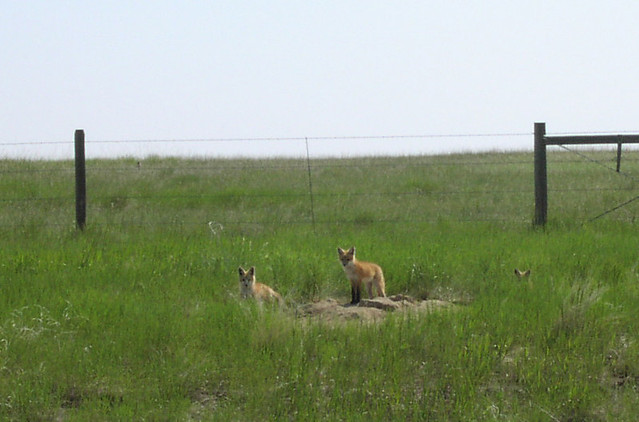
The sound of wind over grasslands for family of red fox, Vulpes vulpes, Montana.
(*photo credit)
January 16, 2015 Sounds and Silence: Needing Pauses
Then came a mighty wind, so strong that it tore the mountains and shattered the rocks before YHWH. But YHWH was not in the wind. After the wind came an earthquake. But YHWH was not in the earthquake. After the earthquake came a fire. But YHWH was not in the fire. And after the fire there came the sound of a gentle breeze. (I Kings 19:11b-12)
Harmony is more than pleasant sounds; it is the actual interplay of pleasing sound and silent pauses -- distant church bells with intervals, playing children at recess, and cow bells tinkling in the meadow. Harmony is the contrasts of light and darkness with accompanying hues and colors. We flee congestion and noise pollution for silent space; we seek to escape air pollution's odors and littered and overdeveloped landscapes. Ultimately we flee to the silent recesses of the heart where God prepares harmonious space for us. We crave harmony like a hunger for food.
The divine harmony is eternal but is revealed to us in space and time. A return to original harmony captivates us and beckons us forward. We hear the distant resonances of the Big Bang. Auditory and other sensations are received through our functioning receptors via surrounding air. Sounds travel at one thousand feet per second and so we approximate distances by how long it takes thunder to reach us after the lightning flash.
We listen to (or perform) music and forget the passage of time. A sound catches our fancy, causes us to pause, to concentrate. We slip from physical time to a psychic suspension of time, a moment of eternity. We awake to "reality," but isn't this moment of timelessness reality also? Good music is in time and yet beyond, ignoring clocks and schedules. Symphonies, no matter how elevating in grandeur, have breaks and pauses for refreshment but, when occurring, make us forget time. In music we glimpse mystery both in time and timelessness; we perceive harmony coursing through our body, a gateway to Divine Mystery revealed in passing time, a moment of grace, a promise of future glory. We seize the moment and experience other-worldliness. The three (past memory, future promise and present moment) are distinct but become one in music.
God's grace floods the universe with a sound hardly perceived except by compassionate listeners. We suffer with others and thus create a balance needed to heal our wounded Earth. We see and yet fail to see; we hear and yet must listen harder. We strive to harmonize our hands, head and heart so as to sharpen our balance, our eco-balance that is interiorly acquired and retained -- a reflection of divine harmony. We partake of the exuberance of creative activity as interested onlookers. January sharpens our senses and raises our hopes to improve our relationship with all creatures so we can rediscover nature's initial harmony.
Prayer: Lord, help us to harmonize with fellow music makers and with a world undistracted by mischief makers.
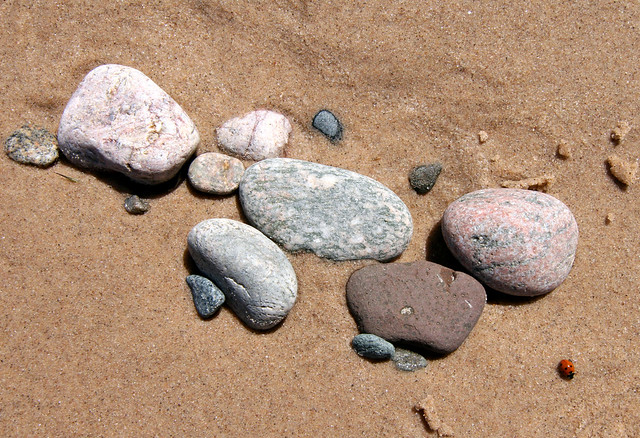
Pebbles and life along a weathered shore.
(*photo credit)
January 17, 2015 Harmonizing within Artistic Activities
Just as a human body, though it is made up of many parts, is a single unit because all these parts, though many, make up one body, so it is with Christ. (I Corinthians 12: 12)
St. Paul speaks of the gathering of the faithful people as a body, and proceeds to call it the "body of Christ." Believers are members of that body and work together for the health and welfare of all. So it is with the creative act of an individual crafter/ artist or a team working together; head and heart and hands contribute to the totality of the artist's creative activity. The head contrives, plans, designs, directs and guides the making of the artifact; the heart gives inspiration and the impulse to demonstrate the artifact to others. A work of art is made public through exposure, a communication for others to admire and benefit. The hands help in the practical creation of the art work, whether an individual's masterpiece or an ecological restoration through cooperative endeavors. While head plans and heart has healing compassion, hands bring the work to completion. All contribute.
Our entire body enters into the creative act to some degree, though some parts contribute more than others. Artists speak about how their work totally involves them, and it certainly must. But even though other body parts contribute to artistic creativity, lowly human hands liberate us and allow us to rise above other primates in dexterity. Human beings develop tools and can make good use of them. Although other animals may excel us in strength in pulling, speed in climbing, and agility in swinging, human beings are the master tool makers, users, and developers. Hands are important, and yet dexterity requires more than hands because a brainless or demented human being with good hands will do little. Also consider that a heartless person can turn tools into weapons.
Good handwork implies a total human integrity. If we use hands in conjunction with our head and heart for the good of others, we become more like the Trinity working in our world and, our bodily harmony shares in the divine harmony of the universe. Such cooperation becomes for us a prayer, a meeting with God. Note that sacred icons are the works of art which are created in an atmosphere of prayer, and the art work itself becomes a form of meditation. The handcraft is a window to Mystery and has been elevated to a high art form, especially by Orthodox Christians.
The creation of an artifact includes a succession of operations -- planning, model-building, theme, experiments, and making it public. The receiving of the art completes the sharing by the community. Art involves body coordination and the product judged satisfactory by the creator -- or discarded. Artists participate in the creative process with the totality of their beings, but the work must be received by us for maximum benefit.
Prayer: Lord, inspire us to share our artifacts as a way to reveal your deeper mystery and to share in all art work.
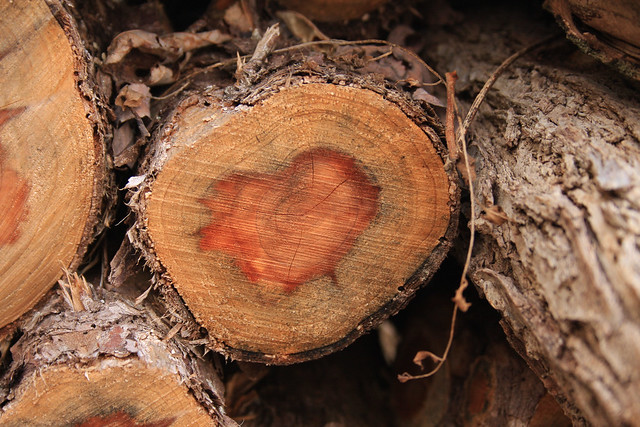
A cord of wood to soften winter's chill.
(*photo credit)
January 18, 2015 Calling "Samuel, Samuel"
"Here I am." (I Samuel 3:4)
God's call to Samuel is a touching episode. Many wonderful elements appear in the short passage. Samuel is an innocent young person who is very responsive to the call of another; thus, he goes immediately to answer the voice, thinking it comes from the old man Eli. But Eli did not call, and still at the second call Samuel goes again, and still Eli denies that he has called. One could have guessed that a less responsive person would have said "to heck with it. I'm going to continue sleeping." All the while we see this from the viewpoint of the old man Eli. He is also disturbed twice and then a third time and only then, in the depths of his good heart, Eli realizes that God is calling Samuel. The lamp of God has not yet gone out. Eli is enlightened, even when only able to see dimly; he tells Samuel to answer, "Speak, Yahweh, your servant is listening." The old man's integrity and closeness to God allows the communication's confusion to become clarified.
Failures in response. So often we all miss the cue, and fail to see that the younger person has an authentic call from God. We fail to direct the person to be open for responding when it comes. It takes as much grace to know that another has a call from God as it does for the individual to respond to the call. Would that all people knew that God constantly calls their near and dear ones, and that they should assist in responding by encouraging the called person to listen attentively to God's message for them.
Individual call. The call from God is unique to each individual. It is one of the most important parts of our journey of faith. Too often we fail to see that this call is ongoing and not just a one-time thing. But often the authenticity of the call is denied, and so we stumble on in the darkness. To hear and listen takes a special grace, and also the openness and willingness to respond as it does for Samuel. We are all called and our degree of generosity to respond is what we seek to increase.
Repeated call. So often we expect that a call comes but once. That is not the case. God's call comes both in unexpected ways at definite times and it constantly occurs on new occasions and under different conditions in our lives. As we grow older, more limited, and less active, a different set of calls can be heard provided we are open and able to receive the message. Eternity calls us.
Crisis in vocations. I really wonder if there is a vocation crisis or whether it is misinterpreted. Perhaps some are not open to God's calling and so we do not have enough personnel to tend to the needs within the Church and elsewhere. Perhaps the call is going out and others are unable to help distinguish the call and encourage people to respond. In the latter case, the crisis, if it exists, is not necessarily with the young as also with elders who do not recognize authentic vocations and assist the called ones.
Prayer: Lord, hear our fumbling response to your call.
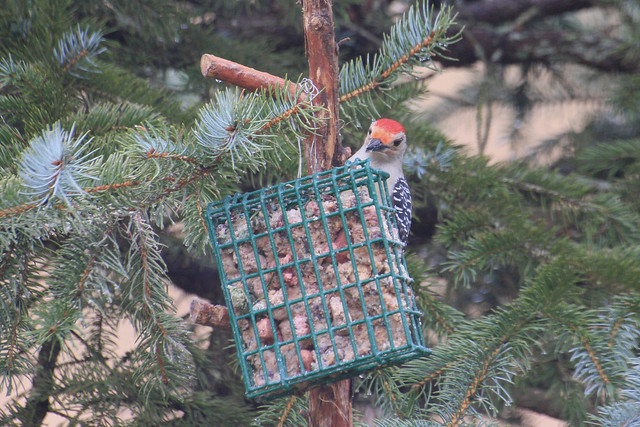
Red-bellied woodpecker, Melanerpes carolinus, at birdfeeder.
(*photo credit)
January 19, 2015 Tasting the Goodness of the Lord
God's favor is a flavor, and we are the taster. God enjoys flavorful things, because God is the origin of all good. We
remember that human cooking arts are what add to the creativity of these flavors, and that we are moved to pass through spoken word and written recipe in our search for what will please our taste buds and also the palates of others. In a season before the growing begins we often seek to prepare tasty soups and dishes of a variety of flavors. We are encouraged to taste and see the goodness of the Lord embodied in good foods. To enter into God's goodness involves a choice of good tastes -- and there are a multitude to choose from. Each of us has our favorites; mine include the exquisite taste of a ripe wild plum in summer, poke shoots in spring, persimmons ripened by the deep freeze of late autumn, and a hickory nut cake in winter. These recall happy times and events; they are like a precious moment of heaven on Earth.
Let me fetch a little bread and you shall refresh yourself before going further. (Genesis 17:5a)
An Appalachian home is a place where a visitor can feel and
taste the refreshment of our region. Just as wanderers in the hot
Middle Eastern desert are always in need of refreshment so, from the earliest days of our region's settlement, travelers are invited to share the simple fare of most mountain households. Even to this day, our folks are concerned about those lost or unsure of their way, about those who cannot find lodging or a place to eat. We are willing to give something of our limited substance to others in need, and never ask payment for it. If a person's car breaks down, in most cases it will only be a short time before someone stops to help. And hospitality is the sign of good taste -- the opposite of stereotypical notions about Appalachia's attitudes towards strangers and foreigners.
When we visited my great aunt and uncle's place in Fleming County as youngsters, Aunt Mary's cookies tasted so good. Perhaps much had to do with the special people, the kind hearts, the serving hands, and the sunshine smile that blessed these foods. They are all part of a hospitable environment, which permeates the food itself. We pray that the willingness to share food with others will never be lost from our Appalachian or wider human tradition -- and that our food will always taste delightful to those who are hungry and come in for refreshment.
We are what we eat, and so we strive to encourage people to eat local produce for this very reason, to be part of their community. We like to taste a little of where we are if possible. On my only trip to the Holy Land I was scolded by one by our guides in central Israel for tasting wild fennel and told never to taste anything green when we go to the Negeb, for if something is green in the desert it will most likely be highly poisonous.
Prayer: Lord, refine our tastes to share with the hungry.
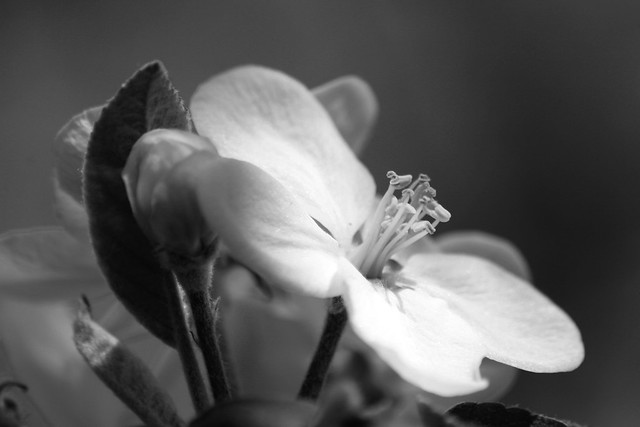
Apple blossoms in Kentucky spring.
(*photo credit)
January 20, 2015 Recounting Ways to Prepare Apples
The best way to eat an apple is from a tree but, the question is whether we can find 365 ways to prepare good apple treats as....
Apple and Brown Rice Pilaf
Apple and Carrot Casserole
Apple and Wilted Lettuce Salad
Apple Barley Pilaf
Apple Beet Salad
Apple Bits
Apple Blue Cheese Slaw
Apple Brandy
Apple Bread
Apple Brown Betty
Apple Butter, Apple Butter Bread
Apple Buttermilk Bread
Apple Cabbage Salad
Apple Candy
Apple Cake, Appalachian Stack Cake
Easy Applesauce Cake, Fresh Apple Cake
Monticello Apple Cake
Apple Cheese and Walnut Salad
Apple Chicken Stir-Fry
Apple Cider, Apple Jack
Apple Cinnamon Yogurt Muffins
Apple Cobbler
Apple Curry Rice
Apple Dumplings
Apple Fennel Soup
Apple Fritters
Apple Grape Salad
Apple Halibut Kabob
Apple Honey Shake
Apple Jelly, Apple Mint Jelly
Apple Oat Bran Muffins
Apple Onion Soup Gratin
Apple Pasta Salad
Apple Pesto Potato Salad
Apple Pie, Apple Pecan Crumb Pie
Apple Raisin and Nut Sauce
Apple Raspberry Salad
Apple, Roast Beef and Watercress Salad
Apple Roll
Apple Salad
Apple Sauce
Apple Squares
Apple Syrup
Apple Tarts
Apple Turkey Saute
Apple Turnovers
Apple Yogurt Trifle, and on and on.
Prayer: Lord, teach us to be creative in making the best with the limited things we have at hand.
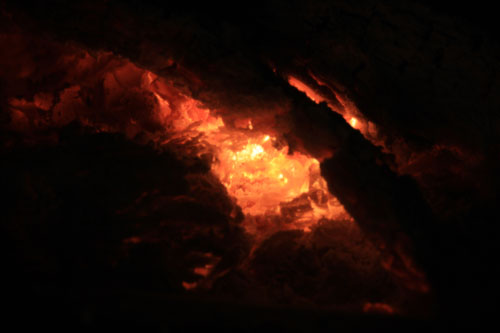
Intricate patterns within burning fireplace logs.
(*photo credit)
January 21, 2015 Establishing a Sacred Aroma
The sons of Aaron must burn this part on the altar,
in addition to the holocaust
on the wood of the fire.
It will be a burnt offering
and its fragrance will appease Yahweh.
(Leviticus 3:5)
The cabin smoke of January indicates occupancy, wellbeing, good will, and a sense of domestic tranquility. The interior of the place is cozy and inviting while the outdoors is harsh. However, smoke elicits an ambivalence, a host of human reactions, some good and some not so. Our ancestors could think of the sacrifice on the altar with its wood‑fueled oblation as an appeasement or as a thanksgiving offering -- even though some describe the actual Temple site where smelly organs are burned. Most certainly, if certain aromas such as the smell of roasting meat are widely liked by hungry people, the Almighty must have first liked them ‑‑ since we are made in God's image. The scent of wood smoke triggers either serious or festive modes, depending on the circumstances of the offering. We react by likes and dislikes.
Our basic attraction to fire stretches back into our prehistory; we are drawn to fire's sight, sound, odor, and feel as
warmth in an instinctive way. A whiff of smoke recalls the creature comforts of a heated place and ample food, or it may set
off fire alarms in the brain. In the not too distant past a smoking factory chimney was a good sign of employment; only in more recent periods of environmental consciousness has the same scene become a sign of a polluted neighborhood.
Early believers considered the Almighty appeased by rich aromas. We detect disturbing odors arising from fouled air and water where resources are misused and wasted. We yearn for the comforting aroma of sweetness that means a return of eco-balance to a distressed world. A healing Earth begins to emit a freshness that must be expanded rapidly to curb threatening climate change. Eco-spirituality is home-oriented and that means we look to homemakers to make Earth once again a truly harmonious place.
Harmony goes beyond sound and is found in cooking and enjoying meals, especially in festival time. Aromas entice us to enjoy more of life that extends in various arenas through the olfactory sense: a faint perfume is enticing, whereas a heavy concentration is repulsive; composting leaves add freshness to the late autumn and early winter air, while we seek to avoid decaying animal matter. Aroma harmonies indicate an accomplished cook, an inviting environment, attractive table setting, and perhaps even soothing music. The home can exude an ambiance of harmony and that extends to our Earthly home environment where natural harmony is craved.
Prayer: Help us Lord to extend an inviting aroma as a form of hospitality to others and do this through Earthhealing.
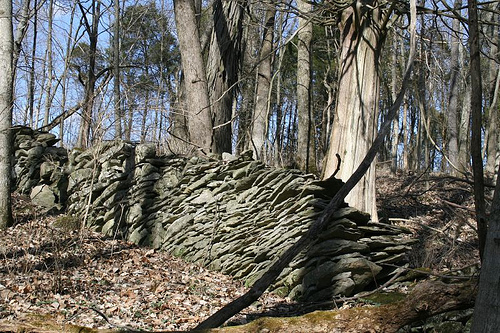
Historic Kentucky rock fence. Woodford Co., KY. Read more here.
(*photo credit)
January 22, 2015 Dignifying Manual Labor
So if all that we have in common means anything to you, welcome him as you would me ... (Philemon 17a)
Workers -- We all worked together at threshing time, whites and blacks in the hot Kentucky sun. No one complained that we sweated in the same field. But when it came time for dinner, and a big one at that for everyone, we were segregated, and whites ate in the kitchen and blacks on the porch. It was the same menu of chicken and twelve other dishes, but customs did not allow us to share a meal together. It really pained us as a family and we had a heart-to-heart dialog and decided to confront southern custom; at our home we would eat together just as we worked together.
Paul urged Philemon to receive back his slave Onesimus (The Letter from Paul to Philemon). So often the ones who toil to make this nation and world are segregated from and overlooked by the ones who enjoy the benefits. That segregation is a denial of the nobility of the work of migrants, servants, child laborers, and the nameless millions or billions who work from the sweat of their brows. They have built levees on the rivers, railroads and highways across the land, irrigation ditches, pyramids, humble cob houses, and small gardens for their families. They have herded goats and cattle and cooked countless meals for hungry mouths.
Work as revelation. Common workers are godly people steeped in glory. A merciful and humorous God reveals part of the divine nature to godly people who sweat and change the world. Shepherds and fishermen are the first to proclaim the Good News of the messianic age -- humble laborers. We plumb the depths of human labor, its artifacts, its character, and its contribution to world history to find something about the Almighty. We acquire a product that is the labor of hands, head and heart cooperating. Pain, sweat, and backache are ingredients in many foods and articles of clothes -- and yet we hardly notice. Compassion makes us sensitive and so does manual labor. We need to divorce ourselves from the sweatshop and reaffirm the nobility of work.
Laborers and the Messianic Age -- Laborers throughout the ages contribute to building pyramids, irrigation canals and roads. Is the one who hoisted the cathedral stone to the next higher platform an artisan or a simple noble co-worker of the stone carver? We see the reflection of God more easily in individual products (crafts, art, gardens, buildings), but this reflection is present also in cooperative works of a multitude. The person who cleans the house does not get recognition but is important in the divine scheme of things. No one's efforts are lost; all is gain. Through their efforts these nameless ones bring on the Messianic Age; they are the faithful chorus, the collective bearers of Good News. Our memories may be short and fade; God remembers our good and forgets our wrongdoing in an atmosphere of Divine Mercy. So be it!
Prayer: Lord, do not forget the works of our hands.
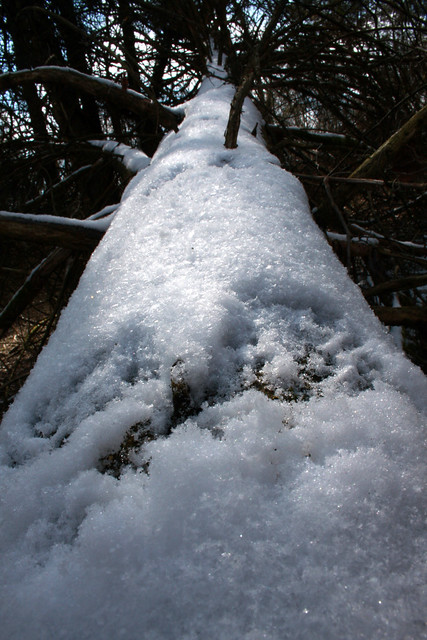
Racoon tracks through newly-fallen Kentucky snow.
(*photo credit)
January 23, 2015 Rendering Footprints As Sacred Touch
How beautiful on the mountains,
are the feet of one who brings good news,
who heralds peace, brings happiness,
proclaims salvation,
and tells Zion,
"Your God is King! (Isaiah 52:7)
Our footprints are part of our bonding with the mountains. But footprints need to be gingerly made, not leaving a lasting imprint, but rather faint and fading with time. We seem to know that our bare feet are more sensitive to the soil than shod feet; bare-footed we experience the land's roughness or softness, its warmth or coldness. I remember well the sun-warmed cow paths in the 1940s, weaving through the ragweed patches in the sunlit meadow in late summer; I remember sharp cold November grass when I stretched barefoot season to an extreme, for I disliked shoes. Footprints create an unforgettable sensation, a closeness to Earth.
Footprints add beauty to the mountains, for they show the love of the one who brings Good News. Their imprint is worth celebrating. It is better that the mountains feel the footprints of people present than that they be depopulated and barren. Nature is at its best when glorified, touched by human presence and bearing the mark of our feet for, without our gentle footprints, nature is not yet fulfilled. In turn, our passage should involve faint and gentle footprints, not the heavy-footed tracks of bulldozers and massive earth‑moving equipment. May we respect the ground on which we tread and always do so ever so lightly!
The places we touch reverently are made holy through raising our minds, hearts, and all senses in a prayer way. We are touched particularly by special places, this little bit of heaven. Sacred space is our declared sanctuary, whether a reserved space or an area of our own heart, where others are not to enter. It is our rest stop for refreshment and clearer focus. Although all land is Holy Land, we designate special places because these manifest a sacredness we need in order to discover God's presence.
Sacred spaces may be unexploited pristine areas -- though these are more rare; they may be grandiose scenic views or quiet nooks, places that touch our souls and where we find a private moment with God. Some places seem completely inappropriate due to human noise or congestion or environmental pollution. The rest stops of life, far from negating our journey of faith, actually punctuate it and show how soon we get out of breath, and how much we need divine assistance. The sacred space may be revisited on a regular basis or only occasionally and yet remain sacred in our memory. We are touched by sacred space.
Prayer: Lord give us the place where sacred vibrations are evident to us in private and poignant ways.
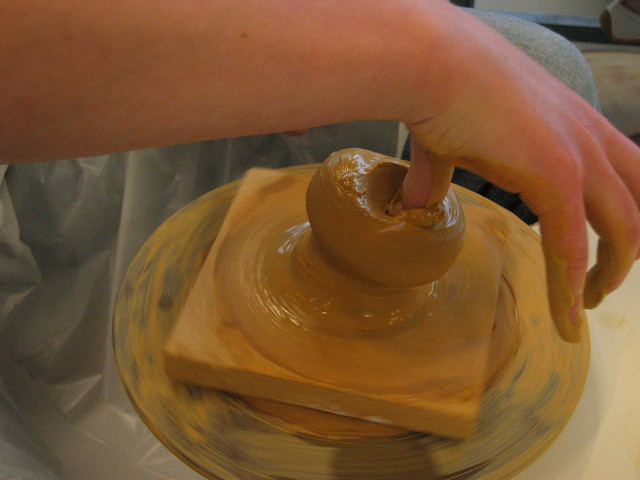
Spinning a wheel to create fine pottery.
(*Photo by J. Graaf, Creative Commons)
January 24, 2015 Touching the Earth (A Potter Molding Clay)
Take a potter, now, laboriously working the soft earth,
shaping all sorts of things for us to use.
Out of the same clay, even so one models
vessels intended for clean purposes
and the contrary sort, all alike;
but which of these two uses each will have
is for the selfsame potter to decide. (Wisdom 15:7)
I came upon a potter at the festival;
she was so diligent and wanted others to observe
the talented works of her hand.
I asked her whether her fingerprints would stay
on the piece that she was fashioning.
She assured me they would not, and
smiled at my ignorance.
She ran the wire under the moist clay
and set the pot free and on its own. A birth!
Is it really so bad if the fingerprint remains,
I said to myself?
For the genius was in the creation,
and this would be her own signature.
We are fashioned from wet clay,
here awhile with smudging fingerprints,
All characteristic of each individual
and no other has the same.
We are clay creations from a mighty potter's hand;
and then we fade in death's own kiln,
Glazed into a reflection of eternal light.
Will not all fingerprints remain?
Although not a potter, I marvel at the work such as I saw Mt. Mitchell State Park in North Carolina. My dad spent his retirement years in Kentucky creating a series of wooden craft and art works, some of which are now housed in local museums. It is the work of our hands, which we offer with bread and wine (grown, milled, baked, picked, fermented, bottled) solemnly at each Liturgy. We offer gifts made by many hands, and we thank God for hands to use the computer -- otherwise no work here. However, handless artists can produce masterpieces. Still, hands participate in creativity and are vital to human progress. Our distant human relative, homo habilis, was aided by hands when he/she no longer needed them to double as feet (standing erect), and thus began to exploit stone for tools, which became a powerful step in human progress.
Our Earth is hardened by January freeze and yet we feel the vibrations of roots starting to grow beneath our feet, for feet feel as much as hands. We feel an edginess to get moving and prepare for the upcoming growing season. It is hard to act alone and enter collaborative endeavors.
Prayer: Lord, teach us to support crafters of all varieties who are your handmaids ushering in a new age through artifacts.
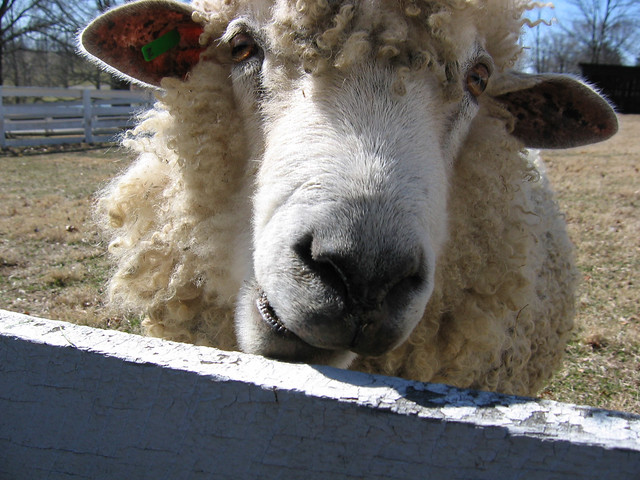
Friendly sheep at Shakertown, Mercer Co., KY.
(*photo credit)
January 25, 2015 Recalling Jonah to Restoration
The Middle East is foremost in our concerns this year. Jonah stands as a true but very human reformer who indicates the need to listen to God in order to come to resolution of our calling. Remembering Jonah in association with a whale is like remembering a speaker by his cab ride to the talk. Jonah is a prophet, one of a great variety, and he suffers from being disobedient in his manner of coming to his mission. He is called to go to the vast city of Nineveh, and yet he goes off to Tarshish -- the ends of the Earth. There is a lot of non-history here, but the Good Book still tells a parable or amusing story that in some way resembles our own lives. Jonah finally listens to the call to convert Nineveh after being in a storm at sea. Reluctantly he is thrown into the sea by those who still show respect for him and his God. He is rescued by a whale, comes to land, goes about his designated but delayed mission, and then complains because of the success of the mission.
The theological story includes reforms needed by audience and by the prophet himself. God is love and mercy, slow to anger and of great compassion at the slightest sign of repentance. God accepts us where we are. The last part of the story is the hardest to understand. Jonah's work is completed and successful and yet he sits outside the city expecting to die. There he sits and God has mercy on him and allows a castor bean plant (Ricinus communis) to grow and shade him -- a good choice since these beautiful but poisonous plants grow so rapidly. It dies and Jonah faces the scorching sun again, wanting to die. God tries to teach him that mercy is necessary, even for people (old and young) as well as for all the brute animals. Even the prophet needs mercy.
The Jonah story has application for us:
* There is humor with God, and we are able to laugh at ourselves along with the Lord, if we strive to reform our ways;
* God is merciful to all and so should we be to those who fault another -- to protagonists and antagonists in Iraq or Syria;
* God's love and mercy extends to the brute animals as well; these are included in calculating the extent of repentance by the Nineveh community -- a remarkable assessment;
* The human prophet fails to see the urgency to bring about reform and to appreciate the mission that is being undertaken;
* Repentance is paramount to the current world, for the harm done is very deep and our need to hear the calling is very great;
and
* We are but servants in the service of our God, and that should be its own simple satisfaction if we but listen and obey the calling we have been given.
Prayer: Lord, amid our fumbling, let us be true Jonahs and seek to bring about change to a troubled world.

Tufts of frost and snow on winter teasel.
(*photo credit)
January 26, 2015 Purging Useless Stuff in Order to Focus
Materials get in the way and are intended to by status quo materialists bent on their own privilege and profits. A primary resolution to advance in spiritual fortitude is to refrain from buying and retaining unneeded material things. When is enough, enough? When is too much harmful? Even if we put goods in a yard sale, it only enhances another's cluttered place with the same requirements of maintenance and storage. If we donate them to form another's clutter are we not offending the Golden Rule, "Would I honestly want someone to push this stuff off on me?" I recall going into a home of a person in northern California and seeing a familiar object from my youthful farm in a decorative front room location. I exclaimed "a corn sheller!" The hostess said I was the first ever to identify it. Unused farm discards are either decorative items or in museums. Time flies!
Some categorize "prepared foods" as a primary form of useless stuff. They are attractively wrapped and filled with chemical preservatives along with excessive salt or sugar. Other non-edible items are convenient but barely more than useless, such as electric pencil sharpeners, can openers, and leaf blowers -- though they could be useful for handicapped persons. Certain forms of exercising devices come high on the list when mere outdoor walking or running could prove much more beneficial. A host of gadgets and wall ornaments, of knickknacks and souvenirs, of games and articles of clothing could be added.
My idol -- When I owned that first car it was like a dream. I had wheels, freedom, power, and independence. What a feeling! I cherished that green 1950 Oldsmobile and of all the things I had to give up, nothing ever hurt me more than parting with the shiny chrome-laden gas hog of the mid-twentieth century. Looking back I'm convinced I idolized that car like a good materialist.
Others have their unacknowledged idols as well. People collect stamps, coins, auto licenses, electioneering signs and buttons and on and on. The worst aspect of retaining useless articles is that it reinforces a miserly mentality that makes people feel more secure because they are surrounded by items they find hard to discard or recycle -- and thus they become junk squirrels (forgive demeaning those varmints who store essential edibles for winter). Retention of useless things is a message from a budding materialist confused about values. Believe me, they are distractions that allow us to lose focus on important issues. Make the 2015 resolution be to stop their proliferation, to realize that they take up space needing heating, cooling and maintenance, and to persuade others to do the same. But let's keep an open mind. Some may find decorative items that beautify their place as ways to uplift their spirits, and treasured enough to give to another in the next holiday season.
Prayer: Lord, teach us to curb any lust for material things and see this as necessary for a good spiritual grounding.
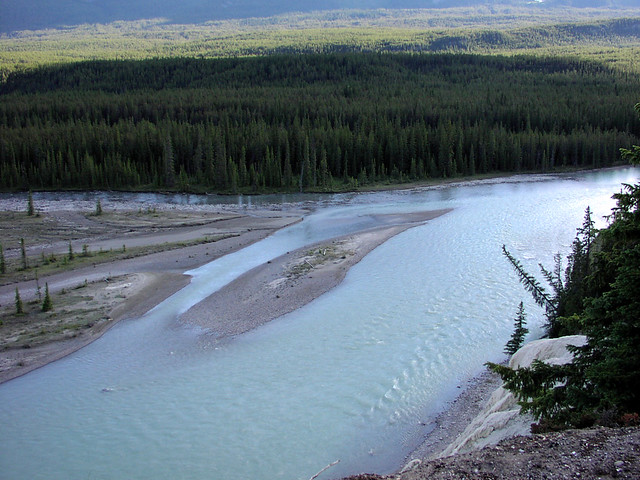
The vast, wild wilderness of British Columbia.
(*photo credit)
January 27, 2015 Knowing and Applying a Conservation Ethic
Make use of created things in as far as they help in the attainment of our end, and rid ourselves in as far as they prove a hindrance. (St. Ignatius, The Spiritual Exercises "First Principle and Foundation.")
During January we strive to conserve energy -- for space heating, in our physical exercise, and to fueling our vehicles. While conservation is a good year-round environmental practice, it appeals to us in dead of winter. Fuel bills mount, exercising outdoors is problematic, and energy packed foods are fattening. A good conservation ethic is the most elementary part of needed environmental action, and that means doing things that are countercultural to our super-charged consumer culture. Yes, the media will scream and Big Energy call us unpatriotic -- but we act.
A conservation ethic is our calling. Waste is out; lower resource (whole grain and fruit and vegetables) nutritious foods are in; personal wants are questioned; essential needs of others are answered. Climate change deniers ignore the concept of commons; they also deny that waste is a blasphemy against an all- good God who creates enough for all. We cannot tolerate wastes that erode the spirit of communal life and manifest a basic insensitivity: "Why did you not feed me when I was hungry?"
Once during a January environmental resource assessment in South Carolina, I challenged a church maintenance director about a window that would not close properly. His reply was, "Don't worry; we have the resources to take care of extra heating bills." I gave a talk six years later in the same building and was amazed to find the very window still not fixed. Did the message get across?
Wasteful people squander time, talent, and opportunities; their wastes distract us and ultimately drag us down. Creation is no longer a wonder to behold; it becomes a commodity to be seized, hoarded, and dumped in favor of something new. We answer wasteful practice by conservation that saves resources, initiates self-control, and allows us to use the resources entrusted to us. Once at an energy ethics summit someone asked whether free solar energy does not permit us to disregard conservation. However, solar installment and maintenance comes at a cost demanding conservation.
Numerous applications of a conservation ethic are found under various topics in the Table of Contents of these Daily Reflections. These include: recycling, composting organic wastes, refraining from purchases, water conservation, cooking hints, energy conservation, especially lighting and space heating regulation, and choosing, operating, and maintaining energy efficient autos. Citizen conservation actions include: support recycling centers, champion environmental education programs, form garden and herbal clubs; preserve local natural resources, feed birds, patronize farmer's markets and garden clubs, and invest locally.
Prayer: Lord, help us embrace a conservation ethic.
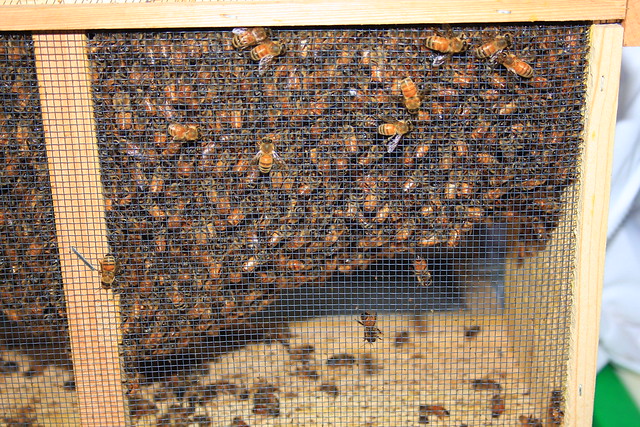
Honeybees, efficient users and producers of food.
(*photo credit)
January 28, 2015 Refraining from Food Wastes
Nothing is more disturbing when at an "all you can eat" restaurant as seeing perhaps hungry folks come, stoke up the plates, and then depart leaving half or more of what they had picked up. Americans waste food, and one estimate is nearly half of all food that enters the kitchen leaves in waste receptacles or the garbage disposal. That is particularly true when people are well fed or overfed, and when the food itself costs relatively little in comparison with other living expenses (perhaps as low as 7% of middle income budgets though higher among poorer folks).
But do we have a qualm about tossing high quality food or foods slightly beyond the sale date when quality declines but the product is not spoiled? Some latitude depends on the way we define "waste." A friend said that when young he would tell his mom who told him not to waste food, that eating it when he was full was wasting it. A good point, but not exactly a whole picture. We can refrain from waste by preserving the food to be eaten later. I will never forget the horror of mountains of food left on students' plates at one university where I was performing an assessment. How can people talk about resource conservation when they say, "I paid for the food so I will take it." The practice is disconcerting to those of us who were taught to eat everything on our plates.
A large area of food waste is fruits and vegetables that can spoil quickly or cease being fresh. The advice never to buy more than is needed is often overlooked. A good dictum is always buy food after a meal, not before one. We tend to buy less excess when we are not hungry. Good homemakers have always known how to make the best of leftover food. Many fruits and vegetables can be saved through some cooking and preservation skills. Blemishes can be removed and the wilted veggies can become prime candidates for soup, thus preserving much of their nutritional value. Fruits, minus the rotten areas, can be cut into fruit cocktails. Leftovers can often be frozen for future use or shared with soup kitchens.
Some are more conscious in curtailing food wastes by cooking only what is needed for the meal. However, this goes against the basic principle that we are to cook in batches to save energy; we refrigerate or store the remaining portions for future meals. If one has a conservationist approach, much more will be saved. A connection between energy and resource conservation can easily be made along with pure economics in avoiding food wastes. Lessons apply to the whole family and most especially youngsters, who do not yet have adult appetites. The habit of leaving a little on the plate is not so bad if the little is really little and not a massive amount while one makes room for dessert. Really, the practice of consuming all on the plate before the more liked dessert is a good habit to instill -- and those denied desserts are often fast learners to be less wasteful. Home is a good place to start healing our planet.
Prayer: Lord, help us to be grateful for our food bounty.
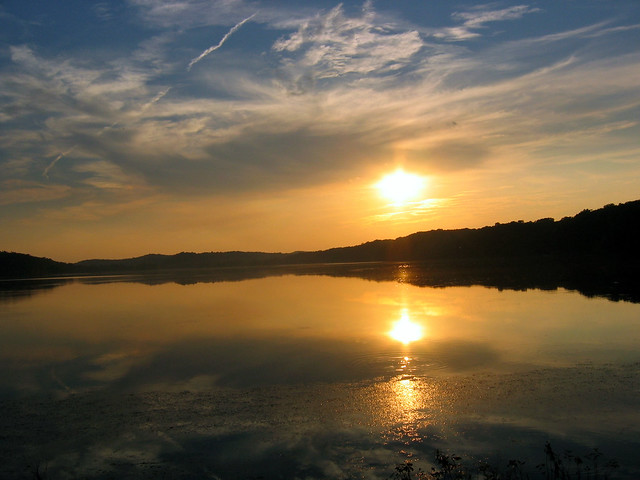
Sunset near Cadiz, KY.
(*photo credit)
January 29, 2015 Creating Sacred Time and Space
We are to pray always, but especially in troubled times like these in more focused prayer. Our spiritual life depends on it. Some insist they do not need to pray: they talk to pets and plants and God in a single conversation. Saints, like hermits Jerome or Fiacre or Blaise, connected with wildlife. Certainly God is near at all times. This is true, but retaining our sense of nearness to God includes a desire for more intense conversation at certain choice times and places -- and this means removal of normal distractions. Reserved time is good for us not because God needs it, but because we do; it is a symbolic expression of not being the owner of time but only its steward. Reservation of prayer time adds to quality of our prayer and our habit of frequency. Busyness is not an excuse to omit a special time and place to pray.
Upon seeing God's creation in its beauty and wonder, we are called to give praise and thanksgiving with attention and sincerity. We know that contemplatives spend much time in formal prayer and most of us do not have that luxury unless we become shut-ins or chronically sick. From the early Church the practice of formal prayer took precedence. The ministry of prayer mentioned as the delegated works of the first Apostles (Acts 6) referred to leading the community in formal prayer. Believers were expected to give formal prayers at designated times and places. In creative ways throughout history believers had the task of making room for prayer time. Amounts and places vary among individual lay folk who are more free to choose times and places, though Christian and Buddhist monks and many Moslems have prescribed times and places.
As Herman Melville says in Moby Dick, "I am a man running out of time." Setting aside time to pray makes this ever-reducing span for each of us as we age all the more important. Really, many will describe their lives as busy though they admit that spare time can be found. Some may say they have no need for periods set aside for personal prayer, saying "In whatever I do and say I pray -- and God hears me." Truly, we believers are convinced God has good hearing and is always attentive, but special time is good for us who lack constant practices. Yes, we rest on the Lord's Day; we need to show time reserved for God as a form of personal sacrifice and as a way to center our lives on the divine with greater intensity.
The period of more intense conversation with the one we love is important for building our relationships. So we desire to see Divine Love grow within us. To say with emphasis that all that God creates is wonderful to behold takes some words on occasion on our own part. For ever-growing reverence we create the spiritual situation of designated sacred time and space. From a practical standpoint we need to organize our day both physically and spiritually. Some of us place our formal prayer or meditation period at the start of the day; others prefer the end of day to review and give thanks for good things that have happened.
Prayer: Lord, inspire us to reserve time for daily prayer.
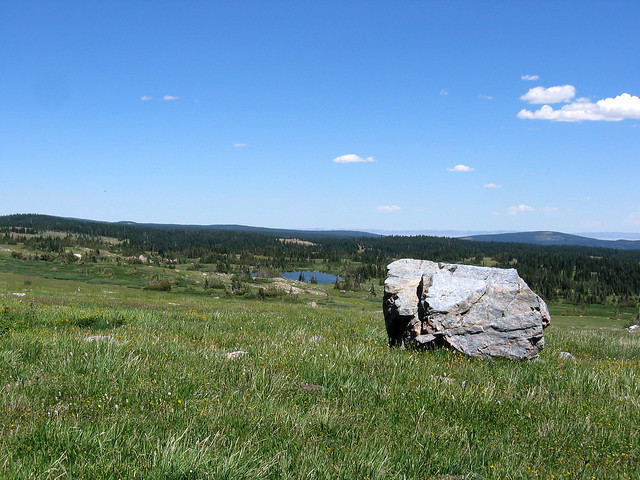
Scenic valley view, Medicine Bow National Forest, WY.
(*photo credit)
January 30, 2015 Defending Our Fragile Earth
Scientific evidence has demonstrated that the global climate is warming as a result of increasing levels of atmospheric greenhouse gases generated by human activities.
Smithsonian Institution Official Statement, Autumn 2014
Climate change deniers do a gross disservice to our planet. They can gather adherents to a narrow religious fundamentalism that has been co-opted by Big Energy and allied special interest groups and persuaded that the entire controversy of anthropogenic climate change is false and a governmental conspiracy. The process used to keep tobacco products unregulated for four decades, even after knowing the use was detrimental to health, is being repeated; this is thanks to these profitable commercial interests making a fortune off of fossil fuel. The very life of Earth is at stake. An authentic intellectual exchange with many Tea Party fundamentalists is impossible and fits well in those affirming that creation occurred in seven days. Deception and large outlays of money have duped actual sizeable numbers -- and politicizing the issue (unlike early environmental ones) is disheartening.
I live in a sea of such religious/political fundamentalism. It seems that many live in fear of a culture that teaches evolution and that their offspring will be contaminated by such biological teachings. I never held a fundamentalist approach to the Genesis account and regarded evolution as part of God's grand design. Genesis was a culturally conditioned theological story, showing the entirely of God's dominion over all creation; however, for local fundamentalists it is a mixed bag, including scientific narrative.
Jesuit scientist/philosopher Teilhard de Chardin considered that cosmic evolution embodies the intrinsic dynamic nature of the universe, which unfolds from the simple material particles through living beings (biosphere), to the conscious dimensions of human beings (noosphere) with increasing complexity and interiority. For many of us Sacred Scripture has a deeper message of growing maturation. Genesis speaks of heavenly bodies by day and by night to keep believers from being confused by the sun and moon gods of a prevailing culture.
Fundamentalists mix modern historicity and in their literal sense focus on the sequence of creation as though a scientific narrative. They are prime targets for denial of modern human actions causing climate change, even though 97% of climate scientists say a very serious situation is happening of which we must take immediate steps. Conservation and environmental action must lead to a deeper commitment to change economic structures that cause climate change. See Healing Earth. Fundamentalists argue that God planted fossils to fool secularist geologists and that dinosaurs cohabited with human beings. The straight-jacket of concocted beliefs makes them apt climate change deniers.
Prayer: Lord, help us defend Earth in an age of deniers.
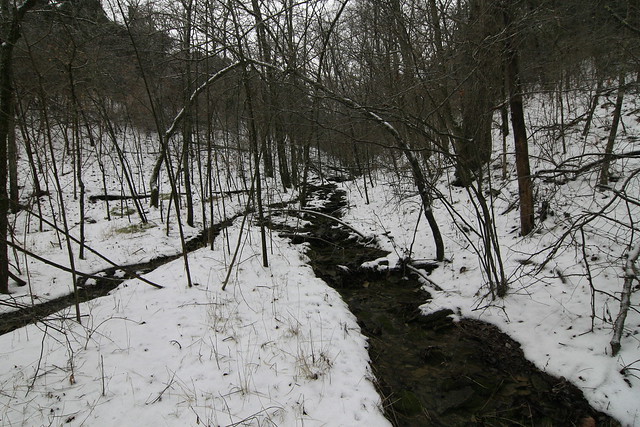
Scenes from a hike on brisk winter day in central Kentucky.
(*photo credit)
January 31, 2015 Reciting and Celebrating Our Common Creed
I believe in one God, the Father, the Almighty,
maker of heaven and earth, of all that is, seen and unseen.
The Nicene Creed
God's creation is a mystery and still it is fragile and subject to be marred by willful human actions. We have much to do to champion the greatness of creation and still in a sense of praise to defend a threatened environment. Throughout the struggles we need to come together and celebrate the work of the people (Liturgy). During this assembly we review our joint commitments by voicing our common creed. This becomes a focal point as we gather in public places, pray, sing, and discover we are social beings destined for togetherness. Our environmental defense and healing is enhanced by these periodic gatherings.
My God is our God and individual private prayer moves from Jesus-and-me to a collective body, a Jesus-and-us. God comes among us as one of us, and stays close to us as our community expands ever broader in space and numbers. In community we come to know what constitutes a loving community, and we see the need for team work in healing our broken world. Furthermore our "we" includes the plants and animals that make up the larger planetary community. Communal bonding grows as does mutual respect for the welfare of all. Joint environmental action at global levels is imperative; limited individual conservation and restoration measures are not sufficient. The People of God are that broader world community that embraces all people of good will, all called as believers in healing our wounded Earth. We need to expand to the "Creatures of God," and include a wider community on this Earth, a community of living beings who are threatened by the impending climate change.
The present moment becomes the time for action, not postponing to a future time what must be done at this moment. We can speak of this being the instant between past events and future happenings but not let our philosophical reflections deflect from the urgency that we experience at this vanishing time span for meaningful change. A rapid rise in global warming, projecting towards 2 degrees Celsius and beyond, causes us to become serious about what the world must do if our descendants are to live on a quality planet. The future depends on present global decisions. The Church as body of Christ must speak and help raise the consciousness for environmental action at a global level. We cannot afford to procrastinate. If we allow the economic consumer system to continue at unchecked rates, disaster will surely follow.
God promised the chosen people a special Holy Land for them and their descendants. With Christ the promised Holy Land includes our entire planet, an insight worthy of celebration and serious concern leading to responsible action. Just as all space is Holy Land, all time is the Divine NOW, and this is the moment to act.
Prayer: Lord, help us celebrate with all creation and in so doing sharpen our responsibility to work together at Earthhealing. |